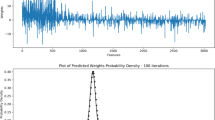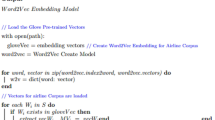Abstract
Nowadays, the Internet has penetrated into all aspects of people’s lives. A large number of online customer reviews have been accumulated in several product forums, which are valuable resources to be analyzed. However, these customer reviews are unstructured textual data, in which a lot of ambiguities exist, so analyzing them is a challenging task. At present, the effective deep semantic or fine-grained analysis of customer reviews is rare in the existing literature, and the analysis quality of most studies is also low. Therefore, in this paper a fine-grained opinion mining method is introduced to extract the detailed semantic information of opinions from multiple perspectives and aspects from Chinese automobile reviews. The conditional random field (CRF) model is used in this method, in which semantic roles are divided into two groups. One group relates to the objects being reviewed, which includes the roles of manufacturer, the brand, the type, and the aspects of cars. The other group of semantic roles is about the opinions of the objects, which includes the sentiment description, the aspect value, the conditions of opinions and the sentiment tendency. The overall framework of the method includes three major steps. The first step distinguishes the relevant sentences with the irrelevant sentences in the reviews. At the second step the relevant sentences are further classified into different aspects. At the third step fine-grained semantic roles are extracted from sentences of each aspect. The data used in the training process is manually annotated in fine granularity of semantic roles. The features used in this CRF model include basic word features, part-of-speech (POS) features, position features and dependency syntactic features. Different combinations of these features are investigated. Experimental results are analyzed and future directions are discussed.
Similar content being viewed by others
References
KIM S M, HOVY E. Determining the sentiment of opinions [C]// 20th International Conference on Computational Linguistics. Geneva, Switzerland: Association for Computational Linguistics, 2004: 1367.
KOBAYASHI N, INUI K, MATSUMOTO Y, et al. Collecting evaluative expressions for opinion extraction [C]// International Conference on Natural Language Processing. Berlin, Heidelberg: Springer, 2005: 596–605.
HU M Q, LIU B. Mining and summarizing customer reviews [C]// 10th ACM SIGKDD International Conference on Knowledge Discovery and Data Mining. Seattle, Washington, USA: ACM. 2004: 168–177.
YAO T F, NIE Q Y, LI J C, et al. An opinion mining system for Chinese automobile reviews [C]// The Academic Conference of the 25th Anniversary of the Chinese Information Society of China. Beijing, China: Chinese Information Processing Society of China, 2006: 260–281 (in Chinese).
POPESCU A M, ETZIONI O. Extracting product features and opinions from reviews [C]// Human Language Technology Conference and Conference on Empirical Methods in Natural Language Processing. Vancouver, Canada: Association for Computational Linguistics, 2005: 339–346.
NI M S, LIN H F. Mining product reviews based on association rule and polar analysis [C]// 3th Chinese Conference on Information Retrieval and Content Security. Suzhou, China: Chinese Information Processing Society of China, 2007: 635–641 (in Chinese).
WANG R Y. The key technology research on opinion target extraction [D]. Suzhou, China: Suzhou University, 2012 (in Chinese).
LIMJ H, HWANG Y S, PARK S Y, et al. Semantic role labeling using maximum entropy model [C]// 8th Conference on Computational Natural Language Learning. Boston, Massachusetts, USA: Association for Computational Linguistics, 2004: 954–961.
LIU T, CHE W X, LI S. Semantic role labeling with maximum entropy classifier [J]. Journal of Software, 2007, 18(3): 565–573 (in Chinese).
ZHUANG L, JING F, ZHU X Y. Movie review miningand summarization [C]// 15th ACMInternational Conference on Information and Knowledge Management. Arlington, Virginia, USA: ACM, 2006: 43–50.
JIN W, HO H H. A novel lexicalized HMM-based learning framework for Web opinion mining [C]// 26th International Conference on Machine Learning. Montreal, Canada: ACM, 2009: 465–472.
LI F T, HAN C, HUANG M L, et al. Structure-aware review mining and summarization [C]// 23rd International Conference on Computational Linguistics. Beijing, China: Association for Computational Linguistics, 2010: 653–661.
KUANG Y, ZHOU Y, HE H. A combination method of CRF with syntactic rules to identify opinion holder [C]// 6th International Conference on Natural Language Processing and Knowledge Engineering. Beijing, China: IEEE, 2010: 11568368.
LIU X. Research on opinion extraction method based on product reviews [D]. Harbin, China: Heilongjiang University, 2015 (in Chinese).
TITOV I, MCDONALD R. A joint model of text and aspect ratings for sentiment summarization [C]// Proceedings of AD ’08. Columbus, USA: Association for Computational Linguistics, 2008: 308–316.
BRANAVAN S R K, CHEN H, EISENSTEIN J, et al. Learning document-level semantic properties from free-text annotations [J]. Journal of Artificial Intelligence Research, 2009, 34(1): 569–603.
BRODY S, ELHADAD N. An unsupervised aspectsentiment model for online reviews [C]// 2010 Annual Conference of the North American Chapter of the AD. Los Angeles, USA: Association of Computational Linguistics, 2010: 804–812.
Author information
Authors and Affiliations
Corresponding author
Additional information
Foundation item: the National Natural Science Foundation of China (No. 61375053), and the Project of Shanghai University of Finance and Economics (Nos. 2018110565 and 2016110743)
Rights and permissions
About this article
Cite this article
Wang, Y. Fine-Grained Opinion Mining on Chinese Car Reviews with Conditional Random Field. J. Shanghai Jiaotong Univ. (Sci.) 25, 325–332 (2020). https://doi.org/10.1007/s12204-020-2184-1
Received:
Published:
Issue Date:
DOI: https://doi.org/10.1007/s12204-020-2184-1




